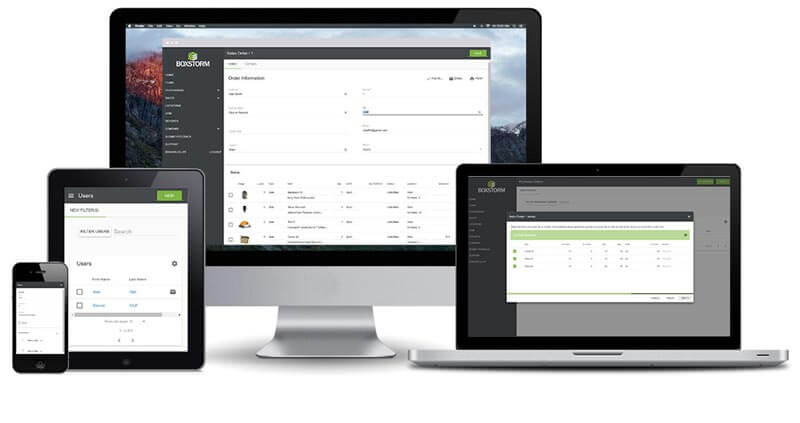Inventory management is the “meat and potatoes” of corporate life for practically all firms. Cloud inventory management software is a newer product, but it is gradually becoming the best option for enterprises.
Inventory management isn’t as flashy as public relations or digital marketing, but it’s the procedure that keeps everything running. There’s no way to know what you need, what you’re selling, or how much money you stand to gain unless you keep a tight check on your inventory. This article discusses the advantages of cloud-based inventory management and what it can achieve for your business.
Finding a great match for inventory management software might be tough with so many alternatives available. We go into more information about the top industry performers below, but our comparison guide might also help you make a choice.
Inventory Management
Inventory management is concerned with the flow of goods, both into and out of the firm. These changes have an immediate influence on expenditure. Inventory levels inform firms about which raw resources they need for manufacturing, allowing them to satisfy demand. While keeping correct records is a difficult task, inventory management software simplifies the process.
Cloud Inventory
The cloud’s appeal stems in part from its scalability, scheduling automation, and real-time tracking. Cloud-based inventory management software is also less expensive since no local servers are required. Not to mention how lightweight and low-maintenance these systems are.
Cloud Inventory Features
#1. Software that is completely scalable
Businesses had to make difficult judgments regarding their operational software twenty years ago. They might purchase for their size and plan to improve later. They may, on the other hand, overestimate their needs. Many would therefore opt for a “baggy” inventory system in the hopes of eventually growing into it.
Fortunately, cloud-based software has altered this by allowing inventory management systems to be completely scalable. Because these solutions are virtual, updates may be performed at any moment. Simply add, delete, enlarge, change, or combine functions to improve the efficiency of your supply chain.
#2. Setup is simple and stress-free.
Inventory management is a critical component of warehousing and distribution businesses. As a result, any amount of downtime is a major issue. Because there are no physical constraints, cloud-based inventory management software offers rapid and easy implementation.
Upgrading or installing a new system is usually as simple as login into a central facility. Because all components of the inventory solution can be managed from a single location, there’s no need to tax your IT staff by installing software on individual PCs or installing specialized hardware. As a consequence, there is less downtime and disturbance.
#3. Real-Time Visibility
Another significant advantage of cloud-based management systems is improved stock control. Having a real-time picture of your inventory may help you make better purchasing choices and avoid understocking. Furthermore, since a single database exists to record critical information, you will not have to bother with analog reporting methodologies.
Intuitive dashboards offer a comprehensive view of the business at any given moment. Furthermore, QR tracking allows you to swiftly examine inventory as it moves from department to department. As you automate additional operations, you will see a significant decrease in error creation.
#4. Reliable Forecasting Tools
It is no longer sufficient to know which three goods are your best sellers. You must also understand when each of them moves the quickest if public holidays affect sales, and whether demand is expected to alter from year to year.
Lack of exact data on these KPIs might have a detrimental impact on your business. If you don’t make precise estimates, you risk squandering money on excess inventory when demand is low. You may risk losing out on growth chances if your product sells out faster than expected.
Current reports from cloud-based inventory management assist you in making smarter choices regarding the future of your items. Not only can you estimate optimum stock levels, but you can also determine the best periods to alter up your items, redesign your marketing strategy, and launch new services.
#5. Always feel safe and secure.
Businesses benefit from optimum security when using cloud-based inventory management software. Data is much safer than in a typical system since everything is automatically backed up. Every bit of data that flows via the software ends up in a cloud database.
If you accidentally delete a file or your hardware fails, restoring access to it is as simple as retrieving it on the cloud. Because about 20% of firms do not frequently back up their information, recovery is a huge benefit. Without the cloud, such data may be lost forever.
Why Should You Opt for Cloud-Based Inventory Management Software?
Information is kept in a secure online database in cloud-based inventory software, where anyone with the right authorization credentials may access it from any web browser or mobile device. In contrast, local storage databases save information on-site in the form of a physical server or hard disk. In comparison to this sort of system, cloud inventory systems offer several benefits.
Cloud-based inventory management aids in the maintenance and monitoring of your company’s inventory while keeping your data private. You don’t have to be concerned about a security breach since your business’s information is well-protected. In addition to superior security, web-based inventory software has other advantages that will put you ahead of the competition:
The most major advantage of cloud-based inventory management is that it puts the data you need to operate your business right at your fingertips. Cloud systems allow you to see your inventory and pending orders in real-time from any connected device, whether you’re in the office or on the warehouse floor.
#1. Data integrity:
With a cloud-based system, you’ll always know you’re looking at the most up-to-date information, and the software automatically encrypts your company’s important data. There’s no need to be concerned about security breaches or duplicate data. The procedure is smooth, which is particularly beneficial in high-volume plants or companies with several locations.
#2. Scalability:
Cloud-based systems expand higher to match your business’s expansion. That means you’ll always have enough storage space to maintain your inventory, and you won’t have to spend money on costly IT upgrades or waste time on software updates, which will help you save money on inventory management.
#3. Low maintenance and running expenses:
Because there is no on-site server to operate, your maintenance expenditures with cloud Inventory will be more predictable.
What sets Cloud-Based Inventory Management Apart?
Precision is essential in every business’s day-to-day operations. Having the appropriate inventory and stock levels might be the difference between a lucrative, scalable business and one that loses you money.
Cloud inventory management keeps IT expenditures to a minimum by automatically updating software regularly. You just pay a prorated percentage of the actual server maintenance cost, which is substantially less than what you would spend on an in-house IT group to keep the server running.
So at any one moment, your inventory should be in two places: physically in your warehouse and digitally in your web database. At all times, your physical item count and digital item count should be the same. You can simply determine your profit margins, markups, and breakeven thresholds if you retain precise digital counts.
Keeping correct digital records for your business that are updated in real-time helps establish responsibility in your business, which develops confidence with your clients. Furthermore, it assists you in identifying any bottlenecks or interruptions in your operation. When your cloud-based inventory management system integrates with your e-commerce sites, software, and other digital touchpoints, you can always stay on top of what’s going on in your business. It maintains that data is accessible at all times and allows you to display it in charts, graphs, and other data representations to tell you about your business’s long-term health.
Read Also: Cloud Technology: Beginners Guide to Cloud Technology Solutions
Cloud-based systems also provide precise precision over your inventory. This reduces mistakes and difficulties and eliminates the possibility of item duplication. All of the information is maintained up to date so that no orders are missed.
From the time you place an order with your supplier until the time you send a product to a client, your cloud-based inventory system can automate each touchpoint of your business and eliminate the human element as much as possible. Freeing up the time and expense of that human work allows you to devote more resources to higher-level strategic decision-making.
A cloud-based inventory does more than just keep your business successful. It’s also more secure and safer. Cloud inventory software is automatically kept on the server of your service provider, where it can be regularly updated to guard against cyberattacks, hackers, and other criminal actors. It’s probably safer with them than on your hard disk.
Cloud-based inventory systems are easy to use, highly automated, and may help you increase your bottom line. It’s just a better, simpler, and more effective way to manage your business.
How to select the Best Cloud Inventory Management Software for your Business
To get the best cloud-based inventory software for your business, consider the features that are important to you. There are several web-based inventory management systems available, each with its own set of benefits and downsides. The best inventory management software not only allows you to keep track of your whole inventory but also allows you to better service your customers.
To ensure that your data is error-free, look for inventory software that offers cloud-based barcode scanning capabilities. You could also want real-time notifications and updates, as well as better storage.
Read about MONITORING SALES PERFORMANCE: How to track Sales Performace (+Quick Tools)
Best Cloud Inventory Management Software
You have alternatives if you want to move from your on-premise system or if you are dissatisfied with your present way of online storage. Here are five of the best cloud-based systems available today:
#1. Cin7 Inventory Management Software
Cin7 Inventory Management is a cloud-based system that offers automated omnichannel inventory management. It includes a POS solution, allowing for a unified system suitable for wholesalers and shops.
This software package connects the sales channels to merchants, and subsequently,y these channels link to warehouses, allowing for improved order fulfillment rates.
The establishment of a B2B eCommerce website is included as standard, and it connects with the ordering system. Cin7 also offers stock management across franchisees or various businesses.
The Cin7 Supply Chain App Store provides a diverse selection (over 100) of third-party and first-party applications that connect into a variety of functions:
- Accounting
- ECommerce management
- Retailing
- Shipping
- Payment management
- And Much More!
So, what more advantages can you anticipate?
Real-Time Goods Monitoring:
Get a complete picture of your inventory by tracking stock in real-time by location and shipment. The Open to Sell (OTS) function allows you to sell the stock while it is en route. A history of all previous orders allows the user to examine them in groups by location, allowing for a rapid check at stock levels and status.
POS System:
Includes a comprehensive online POS system that records incoming stock, calculates an exact cost of goods sold and sells straight from warehouses. It is compatible with a wide range of hardware devices, including barcode scanners, receipt printers, cash drawers, and payment systems.
Warehouse management
This includes managing items at numerous locations by assigning set zones and bins, as well as requesting purchase order receipts from pick-and-pack partners or clients. Create consignment branches that enable you to monitor consignment goods when they leave a current branch.
Forecasting and reporting:
Maintain current stock levels by running forecasting reports that determine the the average sales price. Drill-down data at the granular level is provided, allowing for an attribute overview. Stocks may be put on hold, reserved during a transition, and flagged as a status. Smart Reports, a new tool, will allow you to create purchase orders, sales orders, manufacturing tasks, and more.
Interface with 3rd Party Logistics:
Simple integration with 3PL providers aids in the establishment of warehouses, the provision of stock storage space, and the assignment of personnel to pick and pack orders. This feature also serves as a marketplace, connecting items to huge stores.
#2. TradeGecko
This cloud-based commerce platform includes inventory and order management features. Its target audience consists of medium to small eCommerce and wholesale businesses. TradeGecko can handle items, orders, and customers by combining information about the production, sales channels, and locations.
Keep track of key performance indicators (KPIs) including sales channels, items, and customers, as well as the ability to monitor transaction history reports, account balances, late payments, and orders.
Create workflows with TradeGecko Connect to automate the order process and integrate sales and inventory information across both physical and online sales channels. You may have distinct buyer storefronts, catalogs, and price lists using TradeGecko’s B2B eCommerce site.
Team members may use mobile and non-mobile apps to receive goods, take stock, pick-pack-ship products using a barcode scanner, and print barcode labels.
Here are a few more noteworthy advantages:
Batch and Expiry Tracking:
Reduce product recalls by controlling expiring inventory and order fulfillment. Batch tracking allows you to create and amend batches while allocating them to inventory buckets. This batch monitored list may be used to receive purchase orders, alter inventories, and transfer stocks using the Stocktake tool.
Accounting:
The accounting module streamlines the time-consuming invoicing process by connecting easily with inventory and order management systems. Multi-currency pricing facilitates the conversion of currencies into base currency as well as the exportation of invoices to the accounting system. Split invoicing and integration with Xero accounting software are also available.
Order Fulfillment:
Execute action items following predefined processes to provide a quick order fulfillment procedure. ShipStation integration and third-party explorer add-ons provide bulk shipment alerts to 3PL providers.
Customer Relationship Management (CRM):
An onboard CRM application collects data from clients’ billing information, postal addresses, typical purchase kinds, and purchase amounts to automate discounting operations. Customers’ and suppliers’ information is accessible to individuals in appropriate positions.
Multichannel Inventory Management:
TradeGecko provides a centralized location for managing inventory and orders across all sales channels. Supply level information synchronization aids in the prevention of stock shortages.
#3. Finale Inventory
Finale Inventory is a cloud-based inventory management system ideal for warehouse management and high-volume multi-channel eCommerce applications.
A unified inventory manages orders, integrates multiple channels, wireless barcode scanning, reporting, and warehouse management. This suite also supports process efficiency, stock movement tracking, and the release of notifications when inventory changes.
Finale Inventory integrates with several eCommerce systems, including Magento, WooCommerce, eBay, and Amazon. This ease of use extends to shipping programs such as ShipSration and ShipEasy.
Let’s have a look at some additional advantages:
Inventory Stock Auditing:
Gain insight into your stock operations by providing thorough feedback on changes made by numerous users, as well as keeping track of stock traveling between locations. Every stock activity features timestamp tracking, which may help with order inquiry and organizing.
Lot ID Tracking:
The integration of mobile barcode scanning in Finale Inventory aids in automating barcode learning and the building of product lookup tables. Keep detailed records of each lot id purchases and sales.
Order Management:
A centralized inventory allows you total visibility from any location at any time. To make data-driven business choices, dynamically compute sales velocity and predicted days until stockout. The advanced reordering functionality alerts users to make a purchase order with suggestions on how many units to buy.
Warehouse Management:
Manage inventory, shipping, and order fulfillment from a single location while automatically gathering data. Observe inventory stock in real-time as it is received, picked, and transferred.
Purchasing and replenishment:
Calculate reorders dynamically, combine data, and automate purchase order production. Finale Inventory automatically determines distinct reordering thresholds for each product at specific locations for numerous warehouse operations. An average unit cost algorithm gives information on gross margin based on spending patterns and product costs.
#4. Fishbowl Inventory
Fishbowl Inventory is a great option for small to medium-sized manufacturers, wholesale distributors, and eCommerce businesses. The simple interface with QuickBooks and Xero aids in the automation of numerous business processes that would otherwise consume important time.
Shippers, eCommerce platforms, accounting software, CRMs, and EDIs are all supported by this package.
Fishbowl Manufacturing and Fishbowl Warehouse help to optimize the manufacturing process, warehouse layout, order fulfillment, and inventory. Bills of materials, work orders, and production orders are among the various possibilities offered by Fishbowl Manufacturing. Asset monitoring organizes and monitors asset levels, as well as gives information on products consumption and transfers.
Boxstrom by Fishbowl is a SaaS service that offers inventory management for small businesses in four distinct versions, ranging from free to a premium, “Ultimate” level.
What are any more advantages?
Tracking Assistance:
Manage numerous warehouses, track shipments, check expiry dates, and automatically repurchase products. Fishbowl Manufacturing keeps track of the number and location of each component and reorders them as required. So, a thorough map that depicts product placements throughout your warehouse will provide you with a clear picture of your warehouse.
Accounting, shipping, CRM, EDI, eCommerce, merchant services, and many more processes may be readily integrated. QuickBooks and Xero interface allows accounting records to be linked to inventory data in real-time.
Order Management:
Enable easy pack-and-pick for your employees while also tracking things transported into the warehouse. Set up reorder points for components and easily trace shipments from source to destination to minimize shortages and overstocks.
Inventory management will be aided by the addition of Fishbowl Warehouse and Manufacturing, which will help in managing various locations, monitoring shipments, printing and scanning barcodes, measuring and converting units, and multi-currency procedures.
Reporting:
Fishbowl’s reporting tools and plugins enable the production of barcodes, the shaping of sales, and the conversion of inventory data into graphs to aid in future forecasting.
#5. NetSuite ERP
NetSuite is another cloud-based inventory management solution that caters to corporate resource planning and omnichannel commerce suites. Its applications include financial management, customer relationship management, commerce marketing automation, professional services automation, human capital management, and others.
NetSuite ERP contains NetSuite, OneWorld, and NetSuite CRM for business management, as well as NetSuite Air for professional services. This solution also provides industry-specific solutions for wholesale, distribution, manufacturing, retail, nonprofit, service, and software firms.
Its real-time dashboard features an easy-to-use and up-to-date approach for accessing relevant data.
Now for our last list of extra benefits:
Accounting and Finance:
NetSuite ERP provides end-to-end insight into receivables and payables, as well as order-to-cash connectivity. Support for additional capabilities such as project accounting and reporting on project financials and profitability might offer you an advantage when planning or forecasting.
Order Management:
Eliminate manual procedures by improving order processing. Prevent mistakes and provide a seamless transition from sales quoting through order fulfillment. Order and billing management links sales, finance, and fulfillment teams, which may improve quotation accuracy and reduce billing mistakes.
Supply Chain Management:
With different supply chain features, NetSuite ERP facilitates inventory fulfillment and pricing from production to shop. These include inbound and outbound management, distribution management, warehousing, and inventory management. Get a real-time glance at a critical supplier, inventory, and procurement information.
Financial Closure Management:
Simplify the close process by including capabilities to handle period-end operations while recognizing and reacting to concerns. Period locking prevents improper posts to subsequent periods, while period closing checklists highlight duties that must be completed in a precise order.
Compliance and controls:
With a rule-driven engine that generates financial reporting in line with GAAP and IFRS, you can stay in compliance with numerous accounting standards and laws. Built-in tax filing, reporting, and audit trail visibility help keep your business in compliance.
Now that we’ve gone through several top industry performers, you may take some time to picture your operation’s needs. If you need assistance deciding on certain must-have cloud-based inventory management features, check out our needs guide!
Why is it time to switch to cloud-based inventory management?
While there is nothing wrong with hard systems and real technology, they might seem clumsy when contrasted to elegant, weightless cloud alternatives. Yes, this necessitates an update and increased costs in the near term. However, the results are well worth the effort.
Your business will benefit from smoother, more precise supply chain procedures, fewer mistakes, and a greater level of security. As your supplier connections flourish, you’ll begin to save money and tighten the ship. Before you know it, your firm will be operating like a well-oiled machine.
How has adopting the cloud impacted your inventory management processes? Please leave a comment to let us know!
How does cloud inventory management handle reporting and data analysis?
Companies can gain insight into their stock levels, sales trends, and more with the help of reports and data analysis tools that are standard features of cloud-based inventory management systems. There is flexibility in the reports that can be generated, and data can be exported for additional analysis if needed.
Can cloud inventory management handle inventory adjustments and transfers?
Cloud-based inventory management systems typically feature robust tools for handling inventory adjustments and transfers. Because of this, businesses can easily and quickly keep track of their stock levels, with the most recent data available at all times.
How does cloud inventory management handle serial number tracking and lot management?
Cloud-based inventory management solutions typically include sophisticated instruments for keeping track of serial numbers and lots. By doing so, businesses can keep tabs on their inventory with pinpoint accuracy, as well as handle issues like customer returns and warranty claims with ease.
Can cloud inventory management handle kitting and assembly operations?
Yes, cloud inventory management systems often provide tools for handling kitting and assembly operations. This allows businesses to easily manage the production of kits and assemblies, ensuring accurate inventory levels and enabling effective forecasting and demand planning.
How does cloud inventory management handle product variations and attributes?
Modern cloud-based inventory management systems typically include sophisticated instruments for dealing with product variations and attributes. By keeping track of variations in size, color, and other characteristics, businesses can maintain reliable stock levels and speedily fulfill customer orders.
Can cloud inventory management handle customs and import/export regulations?
Some cloud-based inventory management solutions do, in fact, include features to deal with import/export formalities. By simplifying the process of managing cross-border shipments, companies can safeguard their operations from potential fines and other penalties by ensuring they are in full compliance with local laws.
Cloud Inventory FAQs
What is inventory in cloud?
Cloud-based inventory management allows you to monitor your inventory using a Web browser on almost any mobile or desktop device. We will compare and contrast cloud-based inventory management versus desktop inventory management to examine the several advantages of cloud-based inventory management.
Does cloud computing manage inventory and shipping?
Cloud-based inventory management may significantly enhance customer service. It should provide customers with enough stock levels, service available customers, acknowledge loyal customers and provide delivery alternatives to the customer’s location.
Who made cloud computing?
Cloud computing is said to have been created in the 1960s by Joseph Carl Robnett Licklider, who used ARPANET to link people and data from anywhere at any time. CompuServe began offering a modest amount of disk space to its consumer customers in 1983, which they could use to store whatever files they desired to upload.
- How To Calculate Average Inventory- A complete Step-by-Step Guide
- LEGAL SOFTWARE: 33+ Legal software and programs
- Cloud Accounting: Simple Walk-through Guide For Beginners (+ free tools)
- Cloud Technology: Beginners Guide to Cloud Technology Solutions
- LIST OF MOST PROFITABLE SMALL BUSINESSES: Top 35 (+ detailed guide)






